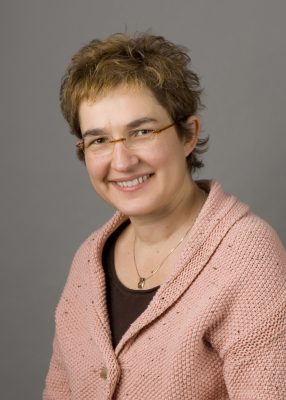Professor Stavreva advances work in Global Shakespeare
Richard and Norma Small Distinguished Professor of English and Director of the Center for Literary Arts Katy Stavreva has published a major collection of articles on Bulgarian Shakespeares.

The six articles, which analyze the role of Shakespeare in the cultural life of post-communist Bulgaria since 2000, were published in the latest issue of Toronto Slavic Quarterly. One of the articles has already been translated into Bulgarian for Impressio, the Culture portal of dir.bg, the first and most frequented Bulgarian online medium. She co-authored the collection of articles with Boika Sokolova from the University of Notre Dame in London.
The English professor has also been traveling and presenting a lot in what she calls a “whirlwind of a summer.”
Stavreva presented a lecture called “Attracted to Ill Humors, or What Hope for Shakespeare’s Cachexic Couples” at the University of Iowa History of Medicine Society in May.
She has traveled to Venice, Italy, where, sponsored by a Global Flex Fulbright Award, she researched two celebrated open-air productions of “The Merchant of Venice” directed by Max Reinhardt (1934) and Karin Coonrod (2016).
While in Europe, Stavreva presented a paper to an international network of scholars at the conference called Visual Worlds: The Aesthetics and Politics of Affect, convened in June at Sofia University, Bulgaria. In July the professor presented a paper at the European Shakespeare Research Association’s conference, AnAtomizing Text and Stage, in Gdansk, Poland. “Shakespeare speaks so many languages,” Stavreva said, “and continues to shape the world’s cultures, even as they shape his dramatic legacy. It is a joy and honor to participate in the thriving scholarly conversations about the world’s fears, frustrations, and hopes, rendered memorable through Shakespearean performances.”
Born and raised in Bulgaria, Stavreva completed a Ph.D. in English at the University of Iowa, held a postdoctoral position at the Folger Shakespeare Library in Washington, D.C., and has taught at Cornell College since 2001. She is author of “Words Like Daggers: Violent Female Speech in Early Modern England” (released in paperback in March 2017), contributing editor of two e-book series on Major Genres, Forms, and Media and on Major Authors and Movements in British Literature (January 2017), as well as of a collection of essays on interdisciplinary approaches to teaching Dante’s “Divine Comedy” (2013), and has published a number of award-winning articles.



